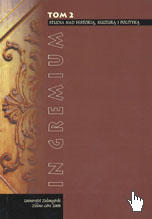Abstrakt
IMMANUEL KANT’S UNDERSTANDING OF GENERAL HISTORY
S u m m a r y
Kant’s philosophy of history tries to put together the rational understanding of history with its sensibility. Such an approach to history reflects the development of reason and the realisation of human freedom. Kant saw the sense of general history in nature’s hidden plan and man’s free and autonomic choices. In his opinion, reason and power of imagination became man’s tools with which to seek solutions applicable not only to himself but to the principles of social life as well. In man, the uncertainty of the future freed the need to create friendly social relationships. Kant viewed history as an intermediate dimension between ‘nature’s cunning’ and the conscientious actions of the man facing unknown fate. Despite the doubts raised by the hitherto man’s performance, thoughtless rather than thoughtful, one should look for the guiding thread which would confirm the correlation between nature and the results of human actions – which, in turn, would allow one to see general history as a sensible process. Kant assumed that general history is a purposeful process, whose end is a citizens’ society under the rule of law. The means, employed by nature to enable humans to use all their potential to establish a lawful order, is the antagonism – which, on the one hand, allows the man to manifest individuality, and, on the other hand, has man engage in collective efforts. The antagonism is an indispensable agent in the development of civilization.

